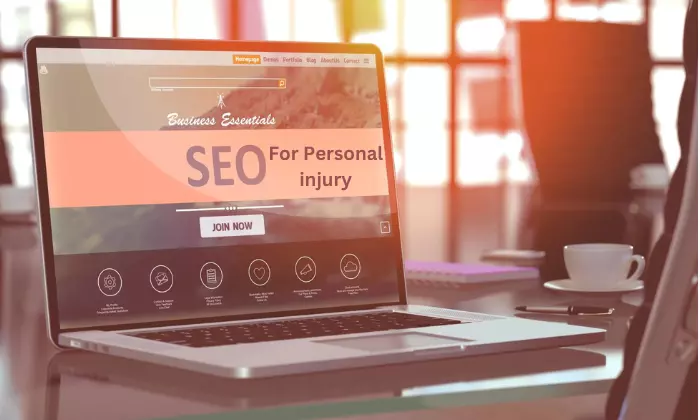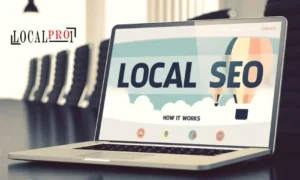Local SEO Services Near Me | Local Pro1 Welcome to...
Mastering SEO for Personal Injury Law Firms: Strategies and Tips
Mastering SEO for Personal Injury: Strategies and Tips
Search Engine Optimization (SEO) is a vital digital marketing practice that can greatly benefit businesses like SEO for personal injury. If you operate a personal injury law firm or offer legal services in this field, understanding and implementing SEO can significantly enhance your online visibility, attract potential clients, and establish your firm as a trusted authority. Local Pro1 will provide you the best service and the guidance related to the SEO for personal injury.

Understanding SEO For Personal Injury Law Firms
Personal injury law encompasses legal cases that involve individuals who have been physically or emotionally harmed due to the negligence, recklessness, or intentional actions of another party. Personal injury cases can include situations such as car accidents, slip and fall incidents, medical malpractice, product liability, workplace accidents, and more. The main goal of personal injury law is to provide compensation to the injured party for their losses, which can include medical expenses, lost wages, pain and suffering, and other damages.
The significance of personal injury law lies in its ability to provide justice and compensation to those who have suffered harm due to the actions of others. It helps individuals recover from their losses, both financial and emotional, and encourages responsible behavior among individuals, businesses, and other entities to prevent future accidents and injuries.
How SEO Can Benefit Personal Injury Lawyers and Law Firms: Search Engine Optimization (SEO) is a digital marketing strategy aimed at improving a website’s visibility on search engines like Google. For personal injury lawyers and law firms, implementing effective SEO services can have several benefits:
Increased Online Visibility: By optimizing their website, personal injury lawyers and law firms can appear higher in search engine results when potential clients search for relevant keywords like “personal injury lawyer in [orlando].” This increased visibility leads to more organic traffic to the website.
Targeted Traffic: SEO allows law firms to target specific keywords and phrases that potential clients are likely to use when searching for legal services related to personal injury cases. This ensures that the traffic they attract is more likely to convert into clients.
Brand Authority: Ranking high on search engines establishes credibility and authority within the field of personal injury law.
Cost-Effective Marketing: Compared to traditional advertising methods, SEO can be a cost-effective way to market legal services. While it might require an upfront investment, the long-term benefits can outweigh the costs.
Local Search Optimization: Personal injury cases often involve location-specific searches, such as “personal injury attorney near me.” Local SEO strategies help law firms appear in local search results, making it easier for potential clients in their area to find them.
Content Marketing: SEO involves creating high-quality, relevant content that addresses common questions and concerns potential clients might have. This not only improves search engine rankings but also positions the law firm as a helpful resource for those seeking legal information.
Mobile Optimization: Many people use mobile devices to search for legal services. SEO involves optimizing websites for mobile responsiveness, ensuring that potential clients can easily navigate the site on their smartphones or tablets.
Competitive Advantage: As the legal industry becomes more competitive, law firms that invest in SEO can gain a significant advantage over competitors who aren’t optimizing their online presence.
What is Personal Injury Lawyer SEO?
Defining Personal Injury Lawyer SEO
Keyword Optimization: Researching and selecting relevant keywords and phrases that potential clients might use when searching for personal injury legal services. These keywords are strategically incorporated into the website’s content, titles, meta descriptions, and headings.
Content Creation: Developing high-quality, informative, and valuable content related to personal injury law. This content can include blog posts, articles, case studies, FAQs, and more. Creating content that addresses common questions and concerns helps establish the law firm as an authority in the field.
On-Page SEO: Optimizing the technical aspects of the website, such as page load speed, mobile responsiveness, and URL structure. This ensures that the website is user-friendly and meets the criteria search engines consider when ranking websites.
Local SEO: Optimizing the website for local search results. This involves claiming and optimizing Google My Business listings, obtaining online reviews, and ensuring consistent NAP (Name, Address, Phone Number) information across various online directories.
Link Building: Acquiring high-quality backlinks from reputable sources in the legal industry and related fields.
Social Media Engagement: Engaging on social media platforms to share valuable content, interact with followers, and increase the firm’s online visibility.
Importance of Specialized SEO for Law Practices:
Targeted Traffic: Personal Injury Lawyer SEO helps attract potential clients who are actively searching for legal assistance related to personal injury cases. This targeted traffic is more likely to convert into actual clients.
Increased Visibility: Ranking higher in search engine results increases the visibility of the law firm’s website, making it easier for potential clients to find them.
Credibility and Trust: Well-optimized websites that provide valuable information and demonstrate expertise build credibility and trust with potential clients, increasing the likelihood of them choosing the law firm for their legal needs.
Cost-Effective: Compared to traditional advertising methods, SEO offers a cost-effective way to reach a targeted audience and generate leads.
Long-Term Results: While SEO efforts take time to yield results, the benefits are long-lasting. A website can continue to draw organic traffic after rising in the results without needing to keep running ads.
Competitive Advantage: Many law practices invest in online marketing, and having a well-optimized website gives a competitive edge by outranking competitors and establishing the firm as a reliable choice.
SEO for Personal Injury Law Firms
Scaling Strategies for Larger Law Firms
Team Collaboration: Establish clear communication and collaboration channels between the marketing team and legal practitioners. Regular meetings can help align strategies and goals.
Delegation: Assign specific roles within the marketing team, such as content writers, SEO analysis, and social media management. This allows for specialization and efficient execution.
Automated Tools: Implement marketing automation tools for tasks like scheduling social media posts, tracking website analytics, and managing email campaigns.
Scalable Content Production: As the firm grows, maintain a consistent content schedule by either hiring more content creators or outsourcing content production to reliable freelancers.
Managing Multiple Lawyers and Practice Areas for SEO
Individual Profiles: Create detailed profiles for each lawyer on the website, highlighting their expertise, experience, and case successes. Optimize these profiles for both their individual names and relevant practice areas.
Practice Area Pages: Develop dedicated pages for each practice area the firm specializes in. These pages should provide comprehensive information about the practice area, case studies, frequently asked questions, and related resources.
Internal Linking: Implement a robust internal linking strategy to connect relevant content across practice areas, lawyer profiles, and blog posts. This improves user experience and helps search engines understand your site’s structure.
Creating a Cohesive Online Brand for the Law Firm
Consistent Branding: Maintain a uniform brand identity across all online platforms, including your website, social media profiles, and email communications. This includes using the same logo, color scheme, and messaging.
Compelling Visuals: Use professional photos of lawyers and the office, along with visually appealing graphics that reflect the firm’s values and expertise.
Engaging Social Media: Regularly post updates, legal insights, success stories, and industry news on social media platforms. Engage with your audience by responding to comments and messages.
Thought Leadership: Encourage lawyers to contribute articles, op-eds, and legal insights to reputable legal websites or industry publications. This establishes the firm’s authority and expertise.
Client Testimonials: Showcase positive feedback and testimonials from satisfied clients on your website. This builds trust and demonstrates the firm’s track record.
Social Media and Personal Injury Lawyer SEO
In the digital age, establishing a strong online presence is essential for personal injury lawyers looking to attract clients and build their brand. Social media platforms offer a powerful tool for achieving this goal. By strategically incorporating social media into your personal injury lawyer SEO strategy, you can effectively share legal insights, provide valuable advice, and ultimately increase your visibility within your target audience.
Choose the Right Platforms: Select social media platforms that align with your target audience. Platforms like Facebook, Twitter, LinkedIn, and Instagram can offer diverse opportunities to connect with potential clients. Research where your audience spends most of their time online and focus your efforts there.
Consistent Branding: Maintain a consistent brand image across all your social media profiles. Use your law firm’s logo, colors, and messaging to create a cohesive and recognizable identity. This builds trust and makes it easier for potential clients to identify your content.
Engaging Content: Create content that resonates with your audience. Share informative blog posts, infographics, videos, and case studies related to personal injury law. Address common legal questions and concerns to showcase your expertise and establish yourself as a trusted authority.
Educational Insights: Provide valuable legal insights and advice that your audience can benefit from. Discuss recent case outcomes, changes in legislation, or important legal developments. By sharing your knowledge, you position yourself as a go-to resource for legal information.
Engage with Your Audience: Respond to comments, messages, and interactions on your social media posts. Engagement fosters a sense of community and encourages more people to follow and interact with your content. Address questions and feedback promptly and professionally.
Utilize Hashtags: Incorporate relevant hashtags in your posts to increase the visibility of your content. Research popular and trending hashtags in the legal and personal injury fields to expand your reach to a broader audience.
Visual Appeal: Use high-quality visuals such as images, infographics, and videos to make your posts more engaging and shareable. Visual content tends to capture attention more effectively than text-only posts.
Post Consistency: Develop a posting schedule that ensures a steady stream of content without overwhelming your audience. Consistency is key to keeping your followers engaged and attracting new ones.
Leverage Paid Advertising: Social media platforms offer targeted advertising options that allow you to reach specific demographics. Consider investing in paid advertising to boost the visibility of your most important posts or to promote events, webinars, or services.
Collaborate and Network: Partner with other professionals in the legal field or related industries to cross-promote content. This can expand your reach and introduce your content to new audiences.
Monitor Analytics: Regularly analyze the performance of your social media efforts using platform analytics and tracking tools. Identify what types of content resonate most with your audience and adjust your strategy accordingly.
Conclusion
In conclusion, the significance of SEO for personal injury lawyers and law firms cannot be overstated. In today’s digital age, where the internet is the primary source of information for many individuals seeking legal assistance, a strong online presence is essential. Effective SEO strategies empower personal injury lawyers and law firms to connect with potential clients actively searching for their services. Feel free to contact us for any type of query or services related to SEO for personal injury.
FAQs
- What is SEO for personal injury?
SEO (Search Engine Optimization) for personal injury involves optimizing online content, websites, and online presence related to personal injury law firms or professionals to improve their visibility in search engine results. This helps attract more potential clients who are searching for legal assistance in personal injury cases.
- Why is SEO important for personal injury law firms?
SEO is crucial for personal injury law firms as it helps them appear higher in search engine rankings when individuals search for legal services related to personal injury cases. This increased visibility can lead to more website traffic, potential client inquiries, and ultimately more cases for the law firm.
- How does SEO benefit personal injury professionals?
SEO benefits personal injury professionals by making their websites more visible to potential clients. This can lead to increased inquiries, more consultations, and ultimately more cases. It establishes them as authoritative sources in the field, helping build trust and credibility.
- What are some key SEO strategies for personal injury websites?
Key SEO strategies for personal injury websites include optimizing website content with relevant keywords, creating informative and engaging blog posts, optimizing meta titles and descriptions, building high-quality backlinks from reputable sources, ensuring mobile-friendliness, and improving website loading speed.
- How does keyword optimization work in personal injury SEO?
Keyword optimization involves identifying relevant keywords and phrases that potential clients might use when searching for personal injury legal services. These keywords are strategically incorporated into website content, headings, meta tags, and URLs to increase the chances of the website appearing in search results for those queries.
Our Services
Our Latest Posts
PPC White Label Services by Local Pro1 | Expert Solutions
PPC White Label Services by Local Pro1 | Expert Solutions...



